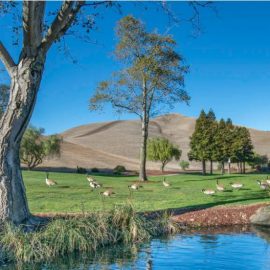
What rhythms does your life follow? When was the last time you bathed in a river?
At Walden Pond, Henry David Thoreau spent hours each day walking in the woods. He bathed in the pond. He got to know individual trees. Drawing from Thoreau’s experience, you can learn how to connect with nature and get into its rhythm.
Continue reading to learn more about Thoreau’s connection with nature and two specific ways you can follow his example.
Thoreau‘s Connection With Nature
One reason that Thoreau moved to Walden Pond was to live a life attuned to the natural world rather than set to the rhythm of life in town. He writes that modern society alienates us from the natural world. But staying in touch with the natural world—with its endless cycle of seasonal change and growth—can inspire us, awaken us, and sustain us both physically and spiritually, he contends.
To Thoreau, connecting with nature wasn’t just about watching the sunrise or listening to the owls. He regarded the time he spent learning from nature as the most important part of his spiritual life. He even considered bathing in the pond every morning as a “religious exercise.” Thoreau writes that we can see great dignity and beauty everywhere in the natural world—even in its small and mundane events.
(Shortform note: For Thoreau, the route between nature and civilization was short, both literally and figuratively. Experts say that his attitude toward nature as a place to find spiritual nourishment reflects broader changes in cultural attitudes about the natural world at the time. Around the time Walden was published, Americans were beginning to regard nature as a place where they could seek peace rather than a place where wildness was to be subdued, as the Puritans had believed when they arrived in New England. The Puritans took the Bible at its word when it described the wilderness as “cursed” and a “kind of Hell” on Earth. They believed they were called to reshape the New England wilderness into a paradise instead.)
Connect With Nature
Thoreau wanted to live in accord with the natural world, but he didn’t have to move into remote wilderness to do it. Just as he adopted a lifestyle in tune with nature at the edge of the woods just outside Concord, you can learn how to connect with nature without leaving the world behind.
Observe nature closely and without an ulterior motive. Thoreau put significant effort into paying attention to what was going on in the natural world. He writes that we engage with nature in a variety of ways. And some of them make it easier to appreciate the natural world than others. Thoreau contends that people who work in the fields and woods—fishermen, woodchoppers, hunters, and so on—are better able to observe the natural world than poets or philosophers. He also argues that behaving like a naturalist is another meaningful way to observe and learn about nature.
Focus on the here and now. Thoreau made a point of taking life at Walden day by day and paying attention to what was happening around him. For example, he recommends that rather than harvesting ice from the pond to cool their drinks in the summer, as people did at Walden Pond in the winter, we stop worrying constantly about the future and instead live in the present moment.
(Shortform note: If Thoreau’s concerns about living in the present and paying attention sound familiar, you might be onto something. In Thoreau’s Axe, Caleb Smith writes that people in Thoreau’s time were just as concerned with distraction as we are today. Thoreau’s advice to pay attention to the moment—perhaps by strolling through nature—seems to anticipate our modern interest in practicing mindfulness. In The Happiness Trap, Russ Harris writes that mindfulness entails deliberately existing in the present and being aware of and receptive to what you experience. Researchers find that mindfulness can help you improve your focus, reduce stress, become less emotionally reactive, and develop flexibility in the ways that you think.)






